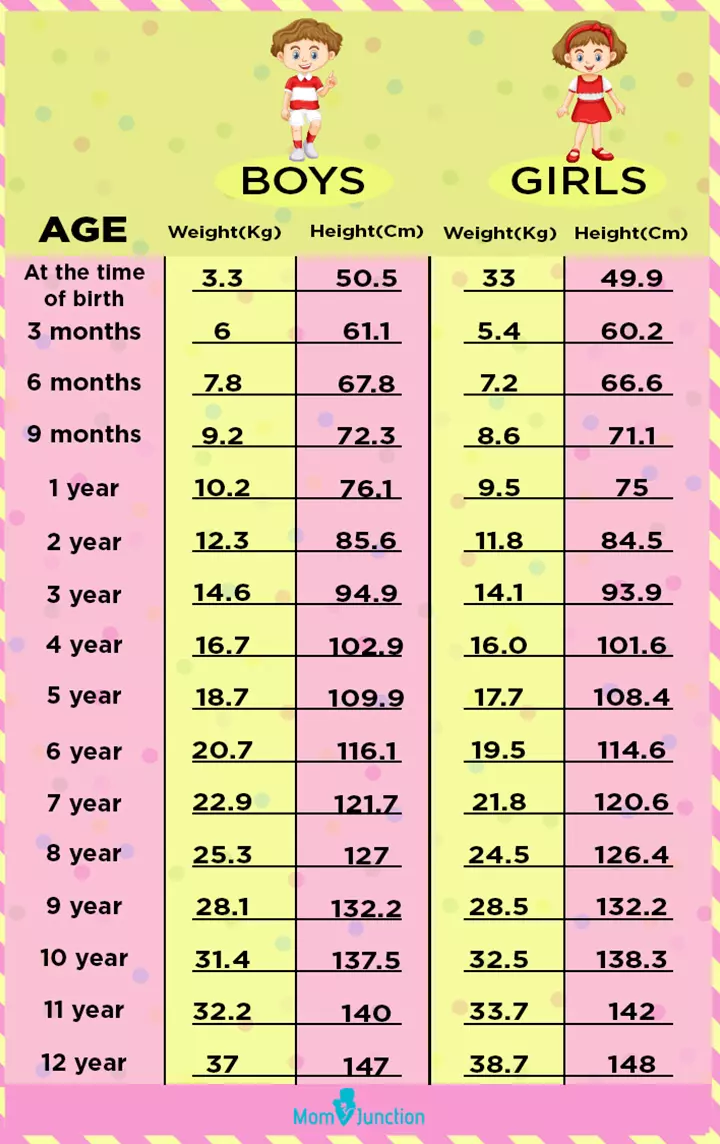

Image: Shutterstock
For parents, constantly worrying about their child’s well-being almost becomes second nature to them. During their formative years, parents make sure that their child gets adequate nutrition required for healthy growth. No wonder then that it becomes all the more stressful for them when they are questioned either about their child’s weight or lack of height. And the constant comparison to other children in the same age group makes matters worse. However, this growth disparity among children of the same age is quite common. But, if you are still worried about your child’s height and weight, then we bring you here a height-weight chart based on your kid’s age to help you out:

Factors That Influence Your Child’s Growth
This chart will give you an approximate idea about the ideal weight and height of your child in accordance with his/her age. However, you need to know that there are a lot of factors that influence your baby’s height and weight. Here, we have broadly classified those factors:
1. Heredity
Image: Shutterstock
Family history and genes play a major role in deciding your child’s height and weight. If more people on both sides of the family have a good height, then chances are that your little one will also go on to be taller.
The same formula applies to weight as well. If you’ve had a family history of obesity or even if one of your parents was obese, then in all likelihood your child too might be prone to becoming overweight.
Image: Shutterstock
Generally, babies grow tremendously during the first year of their life. They might grow 10 cms in height and their weight might also triple from the time of birth. Generally, after the age of 1, the growth slows down considerably. This is when parents might become a little concerned when they do not see the same level of growth in their child. However, kids do experience a few growth spurts once in a while, with the last major growth spurt being the puberty stage (1).
3. Sleep And Nutrition
Image: Shutterstock
Not everything is dependent on age and heredity. A nutritious diet and an adequate amount of sleep are also major contributors to your child’s healthy growth. Sleep pattern may vary for each individual child. On average, children need anywhere between 10 to 12 hours of sleep every night. Because sleep provides the body with the necessary rest that is required for adequate body growth.
Growing children need a plethora of vitamins and minerals to spur their growth. Therefore, a well-balanced diet which includes the necessary nutrients will help children achieve their growth potential to the maximum (2).
4. Growth Environment
Image: Shutterstock
Another important factor that affects your child’s growth is the environment that your child grows in. This includes, but not limited to, your eating habits, cuisine as well as the level of physical activity at home. As a family, if you have unhealthy eating habits – like often binging on fried and high-calorie foods and junk foods or not eating meals on time- they can also lead to your child either becoming underweight or overweight.
When it comes to height, even the constant comparison with taller peers can affect your child’s self-confidence. This, in turn, will make your child disinterested in taking healthy meals or indulging in regular physical activities – all of which will affect the overall growth.
Image: Shutterstock
While this height-weight growth chart is a good reference point for you to monitor your child’s growth, here are a few points to remember:
- No matter how short/tall or thin/fat your child looks, as long as he/she is active and alert, there is nothing to worry about.
- This chart is just an approximate indicator. However, check with your pediatrician for thorough analysis.
- If your child seems dull or disinterested in day-to-day activities, this is when, perhaps, you’ll need to seek your doctor’s consultation.
Remember, one of the key factors to ensure your child grows up to be a well-rounded individual is to accept your little one the way he/she is. So, avoid undue comparison with other children; inculcate good eating habits, and encourage regular physical activities to help your child develop a good overall personality.
Community Experiences
Join the conversation and become a part of our nurturing community! Share your stories, experiences, and insights to connect with fellow parents.



















